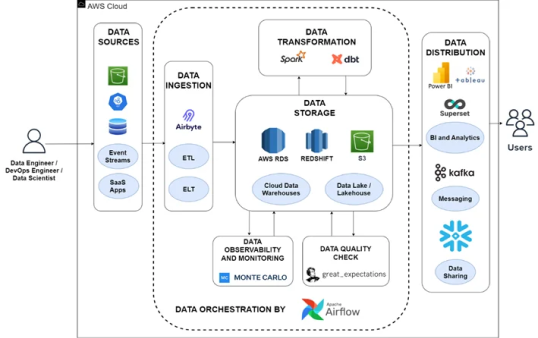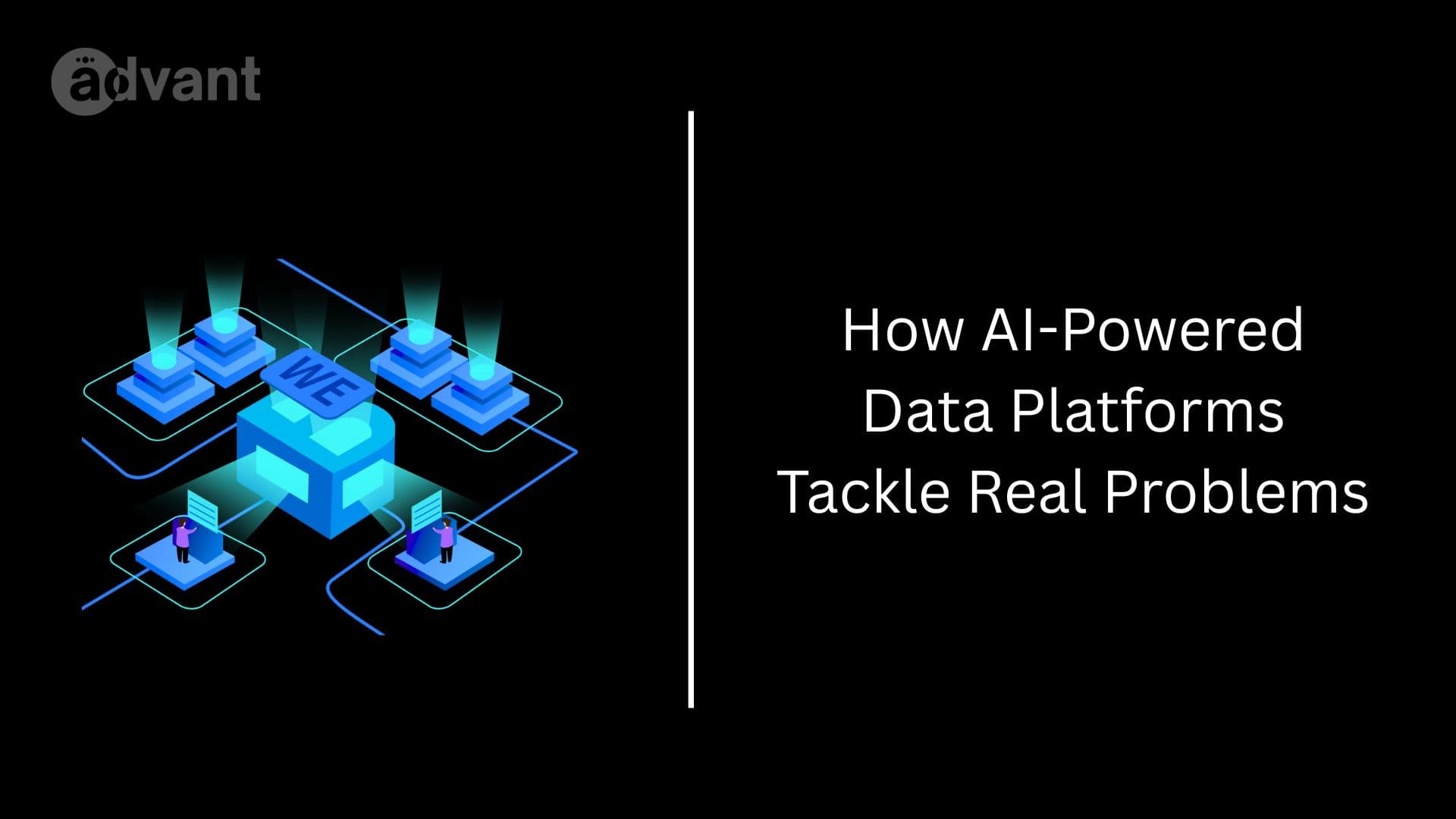Data is the new currency for today’s businesses.
Everybody’s got piles of it, but turning that mountain into something useful?
That’s where things get messy. Companies keep running into the same headaches data trapped in silos, poor quality info, slow analytics, tangled-up governance, and all kinds of trouble pulling real value from messy or lightning-fast data streams.
As digital transformation picks up speed, businesses need smarter data setups ones that aren’t just big and reliable, but actually intelligent.
That’s where AI-powered data platforms are flipping the script.
How AI-Powered Data Platforms Tackle Real Problems
Think about old-school data platforms for a second. Lots of manual work, rigid rules, and governance that moves at a snail’s pace. AI-driven platforms make things easy by automating manual work and adds smart decision making on each step.
From gathering all the data to sorting, analysing and securing, AI changes how data gets controlled effortlessly. Suddenly, validation, classification, security, and even everyday usage start to feel a lot more seamless with the help of AI.
Let’s dig into how these new platforms help organizations beat the biggest data challenges they face. We’ll break down the pain points, show how AI transforms the data game, and point out why these “smart” platforms are giving companies a real edge when it comes to decisions, operations, and the future.
The New Era of Data Messiness
Businesses are getting over burdened by data. New devices, heavy mobile apps, tons of microservices, and real-time streams all flood in structured and unstructured info. By some estimates, the world’s data doubles every couple of years.
Here’s what all that chaos creates:
1.1 Departmental Data Silos
Every team uses its own tools and keeps data locked away. What happens? Duplicate work, numbers that never match up, endless debates over what’s “true,” and a total lack of big-picture insights.
1.2 Bad Data Quality and Messy Standards
Manual data cleaning and old-school validation rules just can’t keep up. The result? Incomplete, inaccurate info, mistakes nobody catches, poor decisions, and wasted time and money.
1.3 Struggling to Scale for Real-Time
Real-time data needs to come in fast, get routed smartly, scale up on the fly, and process with almost no delay. Old systems just can’t handle that kind of pressure.
1.4 Gaps in Governance, Compliance, and Security
Regulations like GDPR, HIPAA, and PCI DSS means a company have to deal with:
- Sensitive data classification
- Tracking where data comes from and goes
- Strict access controls
- Real-time compliance monitoring
Manual processes break down when data is pouring in nonstop.
1.5 Unlocking Unstructured Data
Most company data isn’t neat tables it’s documents, emails, logs, images, audio, video. Old tools can’t really “read” these. They miss context, can’t extract meaning, and struggle to organize it all.
1.6 Trouble with AI and ML
When companies try to roll out AI, they run into:
- Broken production pipelines
- Models that fall apart as data changes
- Not enough monitoring
- Data scientists stuck cleaning data most of the time instead of building models
AI-powered platforms are built to tackle these problems head-on.
What Does “AI-Powered” Actually Mean?
An AI-powered data platform isn’t just another system with a few fancy features. It’s more like an automated improving engine. Machine learning, automation, and smart analytics run on each stage of data life cycle, learning patterns and making the decisions possible
2.1 Smarter Data Ingestion
AI can sniff out new data sources, spot changes in structure, catch weird anomalies, and adjust the way it routes info without people babysitting the process. This makes the whole system tougher and less dependent on manual fixes.
2.2 Better Data Quality
Instead of depending on outdated rules, AI spots outliers, predicts what’s missing, suggest fixes and actually understands the real meaning behind a particular dataset.
2.3 Stronger Governance and Compliance
AI automates the tough stuff classifying sensitive info, setting up flexible access control, letting you search data history in plain language, and flagging suspicious activity. It keeps companies compliant without slowing things down.
2.4 Smarter Metadata Management
AI can tag and organize metadata automatically pulling out entities, mapping relationships, building rich knowledge graphs making it way easier to find and use what you need.
2.5 Real-Time Analytics That Actually Work
AI predicts how much muscle the system needs, adapts to spikes or dips in data, and makes sure the most important info gets priority. No more lagging behind when things get busy.
2.6 Simplified AI/ML Operations
AI-powered platforms handles every single part of model management, so data scientists spend less time dealing with pipelines and more time delivering better insights.

How Modern AI-Powered Data Platforms Tackle Today's Toughest Data Problems
Breaking Down Data Silos
Most businesses have data scattered across dozens of different tools and systems. It detects how different datasets co relate with each other. It connects similar entities, cleans up duplicate data, and brings everything into one compiled view commonly known as an Enterprise Knowledge Graph. Rather than jumping between different systems, teams finally get a single and reliable source of data.
Automatic Data Quality Improvement
It doesn't just clean your data; AI continuously enhances it by spotting weird patterns, filling in missing information, flagging inconsistencies, and fixing problems before they ever become issues. Because machine learning can scan volumes of data more quickly than any human team ever could, your organization gets cleaner, safer data with far less effort.
Smarter Governance and Security
Instead of having to manually check every document or access log, AI can take over much of the governance work: identifying sensitive data, recommending how it should be classified, auto-generating compliance reports, and alerting you if someone in the organization violates a policy. You catch the problems early rather than scrambling to fix them later.
Handling Fast, Real-Time Data
When data is coming fast and in extremely large quantities, AI keeps systems stable. It predicts when you'll need extra processing power, it stores data more efficiently through intelligent caching, and automatically scales resources during any period of heavy traffic. Everything stays smooth and responsive, even under extreme load.
Making Sense of Unstructured Data
Not all information comes in rows and columns. AI can extract meaning from text, images, audio, and more using natural language processing, computer vision, and speech recognition. It can classify documents, transcribe recordings, detect sentiment, and transform messy content into useful insights.
Smarter, Faster Analytics for Better Decisions
With AI, teams get to answers without having to wait through hours of reports. It highlights important metrics, suggests insights, predicts trends, and even lets people ask questions in plain language. Get instant answers to what's really needed, no deep technical skills required for decision-makers.
Scaling AI Across the Entire Organization
Things can get complicated as companies adopt more and more machine learning models. AI-driven platforms manage versions, detect when models become outdated, retrain them, and deploy the models across businesses, keeping everything organized and ensuring AI grows smoothly without chaos.
Also Read: Agentic AI vs. Generative AI: A Clear Guide to the Key Differences
Why This Matters for Businesses Today
Faster decisions: real-time insights become accessible to everyone.
Less manual work: Automation cuts down repetitive tasks in ETL, data quality, and governance.
Lower risk: With better oversight comes lower non-compliance issues and security vulnerabilities.
More agility: Systems automatically adapt as data and usage change.
Happier customers: Personalization and predictive experiences become easier to deliver.
Higher ROI: Data stops being a burden and starts driving real business outcomes.
Real-World Examples
Finance: Automated KYC checks, fraud detection, and compliance reporting.
Healthcare: Integrated patient records, secure data sharing, and AI-assisted diagnosis.
E-commerce: Deep customer insights, personalized recommendations, and smart pricing.
Manufacturing: Predictive maintenance, transparent supply chains, and automated QA.
The Road Ahead: Autonomous Data Platforms
We're headed toward systems that manage themselves: self-healing, self-optimizing, and self-securing. Instead of large teams constantly adjusting infrastructure, AI will be doing most of that work. Companies that adopt this early will have a serious competitive advantage.
FAQs
1. What is AI-driven data platform?
Answer: It is a modern system that uses machine learning and automation for all tasks, from the collection and cleaning of data to governance, analytics, and ML operations.
2. How does AI improve data quality?
Answer: It achieves this by providing capabilities for anomaly identification, predictions of missing values, duplicates identification, an understanding of context, and learning from patterns in the past to result in cleaner, more reliable data.
3. Can it help with compliance?
Answer: Yes, AI can classify sensitive data, enforce rules, track access, and generate audit-ready reports automatically.
4. Is it expensive to switch over to an AI-driven platform?
Answer: Sure, there's an upfront investment, but most see rapid savings due to low manual work and decision-making that can get quicker and wiser.
5. What's the biggest benefit?
Answer: AI transforms fragmented, messy information into real-time insight, powering better decisions, faster innovation, and stronger business growth.
